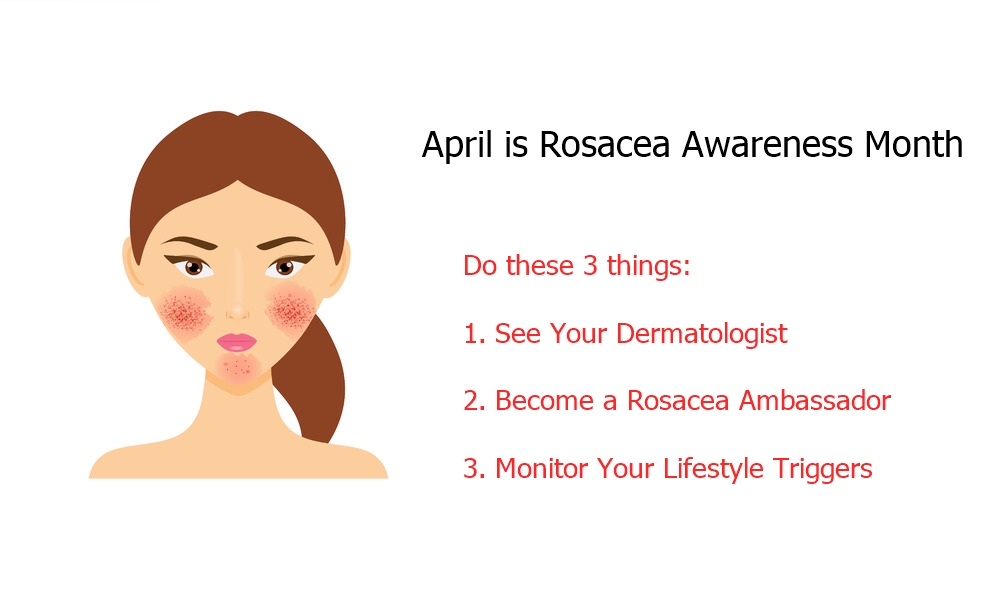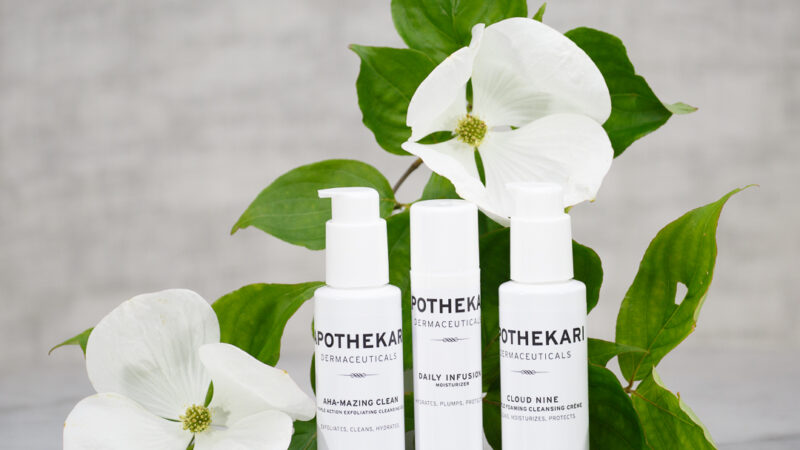Rosacea is a condition that affects more than 16 million Americans and many more worldwide. The National Rosacea Society (NRS) has designated April as Rosacea Awareness Month to educate the public on the warning signs of this chronic but treatable facial disorder.
What is Rosacea?
Individuals are first typically afflicted any time after age 30. Symptoms may initially resemble a simple sunburn or an inexplicable blush. Without warning, the flush may suddenly come to the cheeks, nose, chin or forehead. Just when concerns starts to build, the redness disappears.
Unfortunately, the symptoms appear again and again, with each episode becoming more symptomatic – more redness – and lasting longer each time. Eventually, visible blood vessels may appear. Without treatment, individuals may develop bumps and pimples, which grow more extensive over time, bringing with them burning, itching and stinging. In severe cases, especially in men, the nose may become enlarged from the development of excess tissue. In some people the eyes are also affected, feeling irritated and appearing watery or bloodshot.
Although it’s still not clear what causes rosacea, ongoing research has suggested that it may be a result of several factors including the immune system, the nervous system, facial blood vessels and genetics, as well as the presence of microbes and Demodex mites on the skin. Ongoing medical research may lead to advances in its treatment and potential prevention or cure. If you suffer with rosacea, take heart as there is an expanding range of treatment options for its many potential signs and symptoms.
3 Things You Can do This Month
The NRS recommends doing these 3 things in April:
- See Your Dermatologist. Many rosacea patients had never heard of rosacea prior to their diagnosis. According to the NRS, 95 percent said they had known little or nothing about its signs and symptoms and 90 percent said its effect on their personal appearance lowered their self-esteem and self-confidence. Springtime is referred to by many doctors as “rosacea season” due to the change in weather causing flare-ups in many sufferers.
Now’s the time to see a medical professional for proper diagnosis and treatment. - Become a Rosacea Ambassador. Rosacea is not a result of overindulgence in alcohol or bad hygiene, yet these and other myths persist. If you have rosacea, take the opportunity to talk about your skin and educate others on the disorder.
- Monitor Your Lifestyle Triggers. Common triggers for rosacea include UV exposure, emotional stress, spicy food, alcohol, gluten and sugars.
How To Control Rosacea
It’s important to be aware about what you put on your face so that you can avoid harsh ingredients and triggers. These 4 guidelines can help:
- Read labels to avoid common triggers which include alcohol, witch hazel, fragrance, menthol, peppermint and eucalyptus oil. Astringents and exfoliating agents may also be too harsh for your skin.
- Choose fragrance-free skin-care and makeup products.According to the American Academy of Dermatology, “Fragrances cause more allergic contact dermatitis than any other ingredient.”
- Do A Patch Test First. Before applying a product on your face, try it on a patch of skin in a nearby area, such as the neck. Avoid the product and note its ingredients if you react. Rosacea irritants may vary from person to person, so let your skin’s reaction be your guide.
- Use minimal products.Consider reducing the number of items you use on their skin by choosing products with multiple functions.
By understanding your triggers and attempting to limit and/or avoid them, you can help to reduce flare-ups. Other strategies include exercising regularly, eliminating processed food and optimizing your Vitamin D levels. Medical treatments are also available and you should consult with your doctor to find out if one is right for you.
At Apothekari Dermaceuticals, we avoid ingredients that are problematic for skin. Our line is free from – parabens, formaldehyde, SLS/SLES, phthalates, synthetic fragrances and colorants – ingredients which are common triggers for rosacea. We offer the following treatments, which are specially formulated for sensitive skin and are good options if you have rosacea:
 Cloud Nine Foaming Cleansing Crème. Rich with antioxidant and anti-inflammatory ingredients, this gentle cleanser soothes aging and sensitive skin. It is paraben-free, sulfate-free, fragrance-free and gluten-free and suitable for all skin types, including sensitive skin and individuals with rosacea.
Cloud Nine Foaming Cleansing Crème. Rich with antioxidant and anti-inflammatory ingredients, this gentle cleanser soothes aging and sensitive skin. It is paraben-free, sulfate-free, fragrance-free and gluten-free and suitable for all skin types, including sensitive skin and individuals with rosacea.
 Daily Infusion Moisturizer. This light treatment not only hydrates and plumps skin but also provides anti-aging benefits, protects against bacteria and leaves your skin feeling refreshed. Designed specifically for sensitive skin making it ideal for individuals with rosacea.
Daily Infusion Moisturizer. This light treatment not only hydrates and plumps skin but also provides anti-aging benefits, protects against bacteria and leaves your skin feeling refreshed. Designed specifically for sensitive skin making it ideal for individuals with rosacea.



